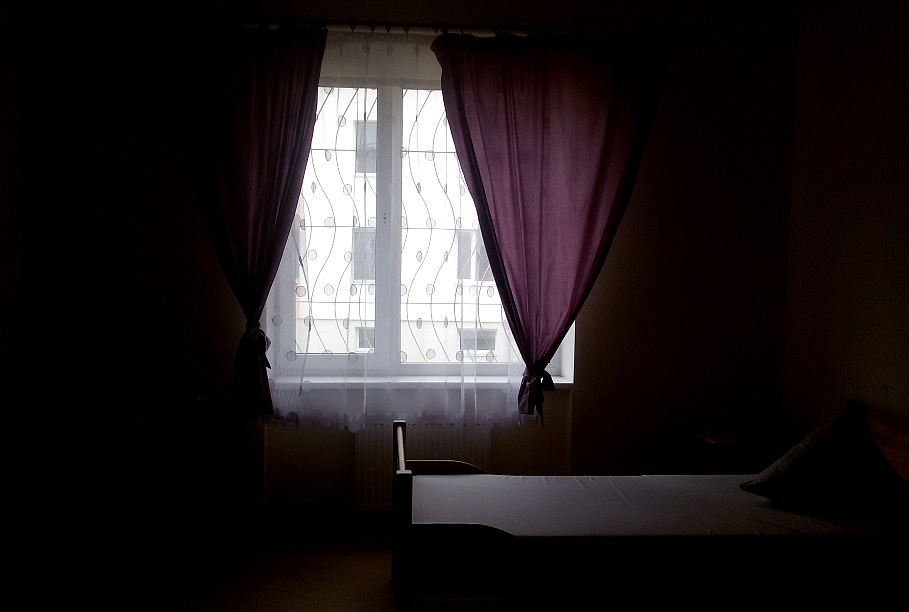Juris (name changed) was born shortly after the renewal of Latvian independence. His mother was young, uneducated, unemployed and living on the street. His father had rejected him shortly after he was born, while his mother's only source of income was begging.
He was removed from his mother at the age of three. "I recall even now that he was crying as they were taking him away. I went everywhere I could, all the institutions. It came to nothing," Juris' mother said.
At the age of seven, Juris was adopted by a sailor living with an adolescent boy, the son of his divorced wife.
"He was a sailor and often went away. I was left on my own. He forbid me to open the door, pick up the phone. He starved me. I ran away from home," Juris said. He spent a year and a half officially but it seems not factually under the sailor's care.
A number of institutions later reported Juris' adoptive father to the police on suspicion of sexual abuse and violence. But the police did not investigate and the reports have now been lost.
At about this time Juris' life became even tougher as he was put into psychiatric care – and this is why, close to twenty years later, he turned to the ombudsman's office. It found that instead of being cared for, he actually underwent more suffering.
In late 1999, eight-year-old Juris was institutionalized in Jelgava and later taken to Rīga and Ainaži. According to the Ombudsman's office, he spent about nine years living in Ainaži.
This is where he was basically forgotten.
During this time, Juris' adoption was revoked. The Orphans' Court should have assigned a guardian to the child, both of whose parents were alive, and there were also grandparents who could care for him. But they were not informed about Juris.
"I had no doubt whatsoever that he was living in a decent, wealthy family and that everything was alright with him," his mother said.
No one visited Juris for these nine years. Legally, there was no one responsible for him.
Juris said that other patients abused him, including sexually.
Now the State Police have started criminal cases over what he underwent at Ainaži and in under the care of the sailor.
Ilona Balode, the head of the Ainaži psychiatric care house, said that she doesn't remember the boy who spent close to nine years at the institution. "I can't comment it. I don't remember," she said.
She has now been suspended as the case is investigated.
After leaving Ainaži, Juris was placed in the Marsa gatve rehabilitation center. After a medical consultation, he was taken off strong psychotropic drugs initially prescribed for aggressive behavior.
It was found that Juris, who was almost of age by now, couldn't name the seasons; he couldn't read or count either. No one had even attempted to teach him something, with the result that it's now almost impossible for him to find a job.
Aivars Krasnogolovs, the head of Rīga Orphans' Court, admits that Juris had been harmed grievously but that at the time laws regulating children's rights in Latvia were only nascent and that the court can't assume responsibility over Juris.
After his father died, Juris had been entitled to a welfare pension, but the Welfare Ministry says the law can't pay it out as the period is too long. The ministry says the Rīga City Council should compensate the child.
"Our institutions do harm easily, but what follows is a very complicated, very bureaucratic procedure in which the person tries to obtain compensation," said Juris' legal representative Artūrs Zvejsalnieks.
Over the past few years, the Latvian public have become more aware of long-running problems at childcare institutions. The EU-wide deinstitutionalization project seeks to halve the number of children staying in such institutions by 2024 and improve existing facilities.
Latvia is implementing a number of changes under the project, including making social tax payments on behalf of the foster families out of work as well as encouraging specialized foster families.
A long-running Latvian Radio strand titled the 'Children of the System' two years ago went out with reports of what appeared to be casual mistreatment of children at orphanages and boarding schools.
In one of the best-known cases, experts sent to examine the Jelgava City Orphanage for the upcoming deinstitutionalization project alleged witnessing several episodes of abusive behavior by the staff.
The case stirred public debate over the treatment of children at state-run institutions, and many of the people who've grown up at an orphanage have shared their stories on Latvian Radio and LSM.




























